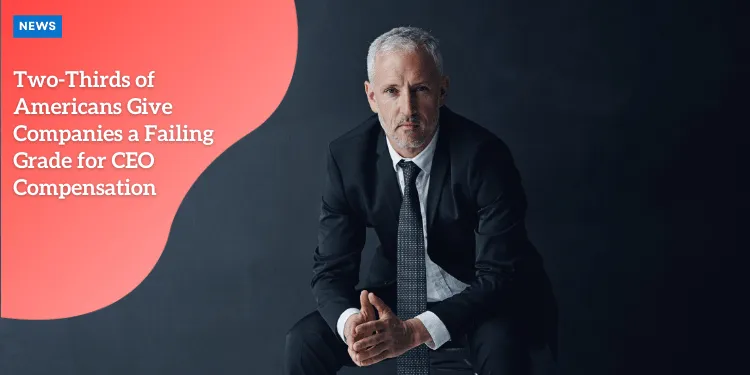Two-Thirds of Americans Give Companies a Failing Grade for CEO Compensation

In a recent Bentley University-Gallup poll shared exclusively with CNN, it was revealed that more than 8 in 10 (83%) Americans believe it’s crucial for businesses to minimize the pay gap between CEOs and average employees.
Anúncios
Notably, 56% of respondents emphasized that this issue is “extremely important.”
Despite this sentiment, the majority of Americans continue to rate corporations poorly in managing this disparity.
According to the poll, a mere 13% of Americans think that companies are doing a good or excellent job in mitigating the significant pay gap between CEOs and average employees.
Anúncios
For the third consecutive year, 66% of respondents have stated that companies are performing poorly in this area.
The findings highlight a remarkable consistency across different age groups and between men and women on both aspects of the survey.
Political and Social Consensus
Politically, the consensus transcends party lines, with a majority of Democrats (96%), independents (83%), and Republicans (67%) agreeing on the importance of reducing major pay gaps.
Anúncios
This widespread agreement underscores how CEO compensation resonates deeply with many Americans, particularly those who are struggling in an increasingly expensive world.
Nell Minow, vice chair of ValueEdge Advisors, which advises institutional investors on corporate governance issues, remarked, “CEO pay is an outrage. It’s atrocious. And it hugely undermines confidence in our institutions.”
Her statement reflects the sentiments of many Americans who view exorbitant CEO pay as fundamentally unfair and damaging to institutional trust.
Significant Disparity in CEO-Employee Pay
The issue at hand is not merely the high earnings of CEOs but the vast disparity between their compensation and that of the average employee.
An analysis by Equilar and The Associated Press revealed that in the past year, it would take a typical employee 196 years to earn what their CEO made in just one year.
Cynthia Clark, a professor of management at Bentley University, pointed out, “Instinctively, it doesn’t seem fair.
This statement encapsulates the core of the public’s discontent.
Despite this existing pay gap, the disparity continues to widen.
In 2022, CEOs earned 185 times more than the median employee, up from previous years.
The Equilar study indicated that while the median S&P 500 employee received an annual pay increase of about $4,300 last year, CEOs saw their compensation rise by $1.5 million. This stark contrast further aggravates the sense of inequality.
Generational and Gender Perspectives
Interestingly, the Gallup survey found little difference between generations on the issue of CEO pay.
For instance, 70% of individuals aged 18 to 29 said companies are doing a poor job in avoiding a significant pay gap, a sentiment echoed by 63% of those aged 60 and above.
Similarly, 67% of men and 65% of women shared the view that companies are handling CEO pay poorly.
However, political affiliation did show a notable difference.
The poll found that 81% of Democrats said companies are doing a poor job, compared to 47% of Republicans.
Among independents, 64% felt that companies are performing inadequately in this regard.
Legislative Measures: Taxing Excessive CEO Pay
In January, progressive lawmakers, spearheaded by Senators Bernie Sanders and Elizabeth Warren, proposed the Tax Excessive CEO Pay Act
This legislation aims to increase taxes on companies whose top executives earn at least 50 times more than a typical worker.
This move represents one of the attempts to close the widening pay gap through policy measures.
Corporate boards, however, find themselves in a competitive struggle to attract and retain top talent.
Higher compensation packages are often seen as necessary to lure capable CEOs who can position the company for success.
Yet, some former CEOs are raising eyebrows at the current compensation trends.
Expert Opinions: Troubling Trends in Executive Compensation
Bill George, former CEO of medical device maker Medtronic, expressed his concerns to CNN, stating, “It’s gotten completely out of hand. What worries me is there is no ceiling on the amounts people are getting. That’s very troubling to me.”
George’s sentiments reflect the confusion and frustration felt by many regarding the seemingly unchecked escalation of CEO pay.
For instance, Broadcom CEO Hock Tan led the S&P 500 CEOs last year, earning $161.8 million.
The second-highest-paid CEO, FICO’s William Lansing, received $66.3 million in total compensation.
George questioned the justification of such high pay packages, especially for companies with relatively modest sales figures.
A FICO spokesperson defended Lansing’s pay, emphasizing his leadership and the company’s strong shareholder returns.
Public Disclosure and Its Effects
Mandatory disclosures since 2017 require public companies to reveal the ratio between CEO pay and that of the median employee.
This transparency was expected to help narrow the CEO pay gap by exposing the disparities, but the results have been mixed.
Cynthia Clark observed, “Ironically, it has not reduced pay.”
She suggested that the data has fueled higher pay demands by arming CEOs with information about their competitors’ compensation strategies.
George concurred, noting, “I think people like being on these lists of highest-paid CEOs. It becomes almost an entitlement.”
This trend reflects the competitive nature of executive compensation, where being among the top earners serves as a status symbol.
Accountability and Blame
Nell Minow argued that there is “plenty of blame to go around” concerning the issue of CEO pay.
Shareholders, in her view, have been “too lenient,” and the media has failed to hold directors accountable.
However, she placed most of the responsibility on corporate boards who approve these enormous pay packages.
The Impact on Trust and Corporate Culture
The effects of excessive CEO compensation extend beyond financial measures, impacting corporate culture and employee morale.
George reflected on his tenure as CEO of Medtronic from 1991 to 2001, during which he was concerned that earning too much would cause a “loss of trust” within the company.
“There is a backlash.”
The persistent discontent over CEO compensation highlights a critical challenge for corporate governance.
As companies navigate an increasingly complex social and economic landscape, the perceptions of fairness and equity play a crucial role in maintaining trust and morale among employees and the public.
Conclusion
The Bentley University-Gallup poll underscores the deep-seated dissatisfaction among Americans regarding CEO compensation.
The escalating pay gap between CEOs and average employees is seen as a reflection of broader inequalities and has significant implications for corporate trust and governance.
While legislative measures like the Tax Excessive CEO Pay Act attempt to address these disparities, the challenge remains substantial.
The public’s discontent with CEO pay is a call for enhanced accountability and transparency in corporate governance.
As sentiments of unfairness and cynicism grow, it becomes essential for businesses to reassesstheir compensation structures and explore more equitable practices that can improve both internal and external perceptions.





